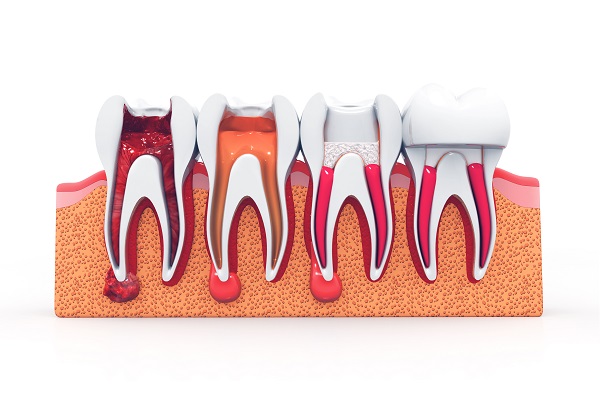



A dentist might recommend root canal therapy if you have a badly damaged, decayed, or infected tooth. The procedure targets narrow openings at the roots of teeth – called canals – that contain nerve fibers and blood vessels that provide sensation and nutrients to teeth.
These nerves play an important role in the development and health of teeth, even if they are infected or decayed. Any damage to the canal leads to severe toothaches. A root canal is a procedure that allows dentists to save severely damaged or infected teeth by removing the pulp inside the tooth and filling up the canal with a rubbery material – gutta percha – to seal off the area.
Root canal therapy can be performed by most dentists, and the procedure takes less than an hour. The procedure sometimes involves patients coming in for a second appointment to get the restored tooth covered with a crown.
Reasons you might need a root canal
Root canal therapy has an unfair reputation as one of the most painful procedures performed by dentists, but that is simply a myth. Local anesthetics are administered at the start of the treatment, so patients do not feel significant pain during it. All they feel is pressure from the dentist working on their tooth and vibrations from tools like dental drills.
Some of the reasons why a dentist might recommend root canal therapy include:
1. Severe decay
Tooth decay is caused by the acids made by oral bacteria eating away at teeth structures, and it can lead to the total loss of a tooth when left untreated. Cavities are often the first visible sign a tooth is decaying, and these small holes continuously expand when left untreated.
The damage will eventually leave the pulp chamber compromised, leaving the pulp inside exposed to oral bacteria, saliva, and debris. The result is excruciating toothaches that make it impossible to focus on anything or get any sleep at night. Root canals are typically performed to save severely decayed teeth. The tooth can then be built up or filed down for a crown.
2. Severe damage
Severe trauma to a tooth can open up the pulp chamber, leaving its contents compromised. Root canals allow dentists to save severely damaged teeth. Such injuries also lead to tooth pain and make teeth more vulnerable to infections.
Root canals are performed on damaged teeth to stop the pain caused by the tooth’s nerve being exposed to irritants, and to prevent future infection.
3. Infection
A root canal is one of the two popular options explored when a patient has an infected tooth. The other option dentists often explore is tooth extraction when there is a serious risk of the infection spreading to other parts of the body. Tooth infections are classified as dental emergencies since there is always a risk of the infection spreading to other parts of the body. For example, bacteria can make their way from the tooth to the brain, where they can have life-threatening effects. A root canal can be performed to stop the infection in its tracks and prevent it from spreading to other parts of the body.
We can save your tooth
Dealing with a severely damaged, decayed, or infected tooth? Our dentist might be able to save it. Call or stop by our McAllen office to set up an appointment.
Request an appointment here: https://www.lunadentalrgv.com or call Luna Dental at (956) 243-8765 for an appointment in our McAllen office.
Check out what others are saying about our dental services on Yelp: Root Canal Treatment in McAllen, TX.
Related Posts
Finding out that you need a root canal can be nerve-racking. Caring for the treated tooth can be even more stressful. Knowing what to do after the treatment can help you prepare well for it. Here are some tips for a smooth and quick recovery after your root canal.The patient must wait to eat as…
Finding out that you need a root canal can be nerve-racking. Caring for the treated tooth can be even more stressful. Knowing what to do after the treatment can help you prepare well for it. Here are some tips for a smooth and quick recovery after your root canal.The patient must wait to eat as…
A root canal treatment can restore your tooth. It is an invasive treatment that aims to remove the damaged or infected pulp. But what should you do after this outpatient procedure? Here are the details on what will happen after a root canal.The dentist will suggest waiting until the effects of the anesthesia fade before…
Emergency dentistry provides the urgent treatments that you need when you need them. This can end up saving your life because untreated dental issues like infections can be life-threatening. Emergency dentistry also gets you relief from any pain and discomfort caused by the oral problem that you are struggling with.Wondering what life-threatening issues quick dental…


